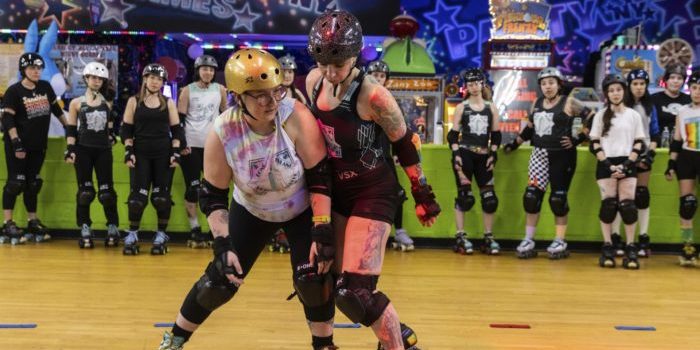(Headline USA) A New York judge on Friday struck down a Long Island county’s order banning female-identifying transgender athletes after a local women’s roller derby league challenged it.
Judge Francis Ricigliano ruled that Nassau County Executive Bruce Blakeman didn’t have the authority to issue his February executive order, which denies park permits to any women’s and girl’s teams, leagues or organizations that allow transgender athletes to participate.
He wrote in his 13-page decision that Blakeman’s order was aimed at preventing transgender athletes from participating in girls’ and women’s athletics in county parks, “despite there being no corresponding legislative enactment” providing him with such authority.
“In doing so, this Court finds the County Executive acted beyond the scope of his authority as the Chief Executive Officer of Nassau County,” Ricigliano wrote.
Amanda Urena, president of the Long Island Roller Rebels, which challenged the order, said the decision sends a “strong message” against discrimination.
“Today’s decision is a victory for those who believe that transgender people have the right to participate in sports just like everyone else,” Urena said in a statement. “County Executive Blakeman’s order tried to punish us just because we believe in inclusion and stand against transphobia. Trans people belong everywhere, including in sports, and they will not be erased.”
There is considerable evidence showing that biological males have an unfair advantage due to the testosterone levels and other hormones present during their development, even if they have since begun estrogen treatments and other processes intended to “feminize” themselves.
For girls playing at the competitive level, this often flies in the face of Title IX protections, ruining their chances at athletic scholarships and other opportunities to perform at a higher level due to mediocre male players arbitrarily deciding to switch identities.
In other situations, co-ed competition may pose a greater danger of injury. Such was the case for Payton McNabb, a North Carolina high school volleyball player who suffered a concussion after being injured by a transgender athlete.
McNabb, along with former college swimmer Riley Gaines, has become one of the prominent public faces in opposition to transgender participation in female sports.
With at least one lawsuit likely to go before the U.S. Supreme Court next session, some sports leagues are beginning to revisit their initial blind support in the face of mounting backlash.
However LGBT activists still have ample resources of their own to wage a counterattack using friendly judges and leagues such as the Long Island Roller Rebels, in which co-ed participation is something of a moot point since getting hurt is one of the main objectives.
The New York Civil Liberties Union, which filed the suit on behalf of the league, said the decision overturned a harmful policy that attempted to “score cheap political points by peddling harmful stereotypes about transgender women and girls.”
The attack is an ironic one considering the widespread criticism that transgender “women” do little more than perpetuate stereotypes of womanhood.
Blakeman dismissed the judge’s decision as one that didn’t address the merits of the case. The ruling doesn’t delve into the civil rights arguments raised by both sides, instead focusing on the limitations of the county executive’s powers.
“Unfortunately girls and women are hurt by the court,” he wrote in an emailed statement.
Blakeman had maintained the ban was meant to protect girls and women from getting injured if they are forced to compete against transgender women.
It impacted more than 100 athletic facilities in the densely populated county next to New York City, including ballfields, basketball and tennis courts, swimming pools and ice rinks.
But the roller-derby league, in its suit, argued that the state’s human rights and civil rights statutes explicitly prohibit discrimination based on gender identity.
The league’s lawsuit cited the state’s Gender Expression Non-Discrimination Act, or GENDA, as well as guidance from the state Division of Human Rights, which confirms that public accommodations cannot deny transgender people access to programs and activities consistent with their gender identity.
The league filed suit after it applied for a permit to host a slate of games at roller rinks in various county parks this summer that it’s used in previous years for practices and other events.
The Nassau County-based league, which was founded in 2005, said it welcomes “all transgender women, intersex women, and gender-expansive women” and has at least one league member who would be prohibited from participating under the county’s order.
A federal judge, in a separate legal case, rejected Blakeman’s bid to prevent the state attorney general’s office from taking action against the ban after it issued a cease-and-desist letter warning him that the order violated the state’s anti-discrimination laws.
LGBT advocates say bills banning trans youth from participating in sports have passed in 24 states.
Adapted from reporting by the Associated Press

